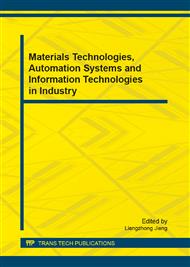[1]
P. T. Vasudevan , B. Fu, Environmentally Sustainable Biofuels: Advances in Biodiesel Research, Waste Biomass Valor. Vol. 1 (2010) , p.47–63.
DOI: 10.1007/s12649-009-9002-1
Google Scholar
[2]
Z. Yaakob, M. Mohammad, M. Alherbawi, Z. Alam and K. Sopian, Overview of the production of biodiesel from Waste cooking oil, Renewable and Sustainable Energy Reviews. Vol. 18(2013) , p.184–193.
DOI: 10.1016/j.rser.2012.10.016
Google Scholar
[3]
I.B. Bankovi´ c-Ili ´c, O.S. Stamenkovi´c, V.B. Veljkovi´c, Biodiesel production from non-edible plant oils. Renewable and Sustainable Energy Reviews . 16 (2012), p.3621– 3647.
DOI: 10.1016/j.rser.2012.03.002
Google Scholar
[4]
L. Lin, C.S. Zhou, V. Saritporn, X.Q. Shen, M.D. Dong. Opportunities and challenges for biodiesel fuel. Applied Energy. Vol. 88 (2011), p.1020–1031.
Google Scholar
[5]
J. Shin, H. Kim, S.G. Hong, S. Kwon, Y.E. Na, S.H. Bae, W.K. Park, and K.K. Kang, Effects of ultrasonification and mechanical stirring methods for the production of biodiesel from rapeseed oil, Korean J. Chem. Eng. Vol. 29 (2012) , pp.460-463.
DOI: 10.1007/s11814-011-0205-3
Google Scholar
[6]
J.X. Wang, K.T. Chen, S.T. Huang, K.T. Chen, C.C. Chen, Biodiesel Production from Soybean Oil Catalyzed by Li2CO3. J Am Oil Chem Soc. Vol. 89 (2012), p.1619–1625.
DOI: 10.1007/s11746-012-2074-2
Google Scholar
[7]
A.G. D. Santos, V.P. S. Caldeira, M.F. Farias, A.S. Arau´ jo, L.D. Souza, A.K. Barros, Characterization and kinetic study of sunflower oil and biodiesel. J Therm Anal Calorim. Vol. 106 (2011), p.747–751.
DOI: 10.1007/s10973-011-1838-5
Google Scholar
[8]
L.J. Gao, G.Y. Teng, G.M. Xiao, R.P. Wei, Biodiesel from palm oil via loading KF/Ca-Al hydrotalcite catalyst. Biomass and bioenergy. Vol. 34 (2010), pp.1283-1288.
DOI: 10.1016/j.biombioe.2010.03.023
Google Scholar
[9]
S.Y. Liu, Y.F. Wang, J.H. Oh, J.L. Herring, Fast biodiesel production from beef tallow with radio frequency heating.Renewable Energy. Vol. 36 (2011), pp.1003-1007.
DOI: 10.1016/j.renene.2010.09.015
Google Scholar
[10]
B.B. Uzun, M. Kılıç, N. Özbay, A.E. Pütün, E. Pütün, Biodiesel production from waste frying oils: Optimization of reaction parameters and determination of fuel properties. Energy. Vol. 44 (2012), pp.347-351.
DOI: 10.1016/j.energy.2012.06.024
Google Scholar
[11]
A.N. Phan, T.M. Phan, Biodiesel production from waste cooking oils. Fuel. Vol. 87 (2008), p.3490–3496.
DOI: 10.1016/j.fuel.2008.07.008
Google Scholar
[12]
X. Wen, M.Y. Ma, X.M. Wu, S. Chen, Z.B. Xiao, J.B. Liu, Preparation of Biodiesel from CormusWilsoniana Fruit Oil by Ultrasound-assisted Transesterification. Chemistry and Industry of Forest Products. Vol. 31 (2011), pp.58-62.
Google Scholar


